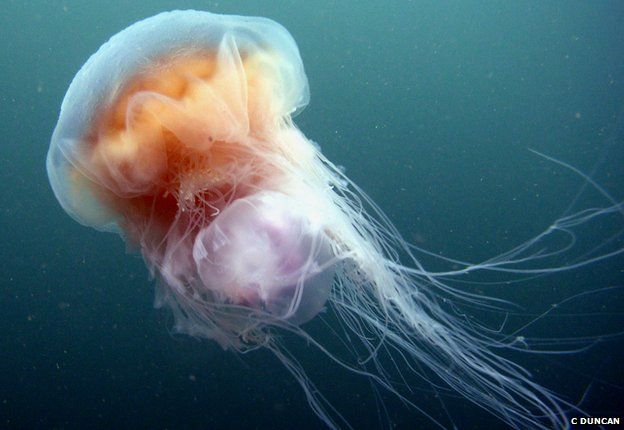Jellyfish set for record number of sightings
- Published

Wales has been hailed as a jellyfish "hotspot" by researchers who say they could hit record numbers this summer.
Mild winters and warm summers have led to more sightings in recent years, the Marine Conservation Society claimed.
Harlech was a haven for barrel jellyfish, with the lion's mane jellyfish being seen off north Wales.
The findings come in what is claimed to be the first UK-wide survey of jellyfish in more than 40 years.
Jellyfish had a major economic impact through their effect on tourism and fish stocks, and gave a guide to the state of the planet, the MCS said.
MCS biodiversity programme manager Dr Peter Richardson said Wales was one of the most rewarding parts of the UK for jellyfish study, with more reports and more species.
Swansea University's Dr Victoria Hobson tells Felicity Evans that Welsh waters are attracting giant jellyfish
'Phenomenal'
Carmarthen Bay, Tremadog Bay and Anglesey were cited as key locations for jellyfish, with increasing numbers of larger groups being spotted in recent years.
The MCS said 2013 was a record year for jellyfish sightings, with more than 1,100 reports.
"Last year was phenomenal, the biggest in the history of our survey," said Dr Richardson.
"But we've already had 500 sightings and we're only halfway through the summer season."
Despite the nasty sting of the lion's mane jellyfish and the rarely seen Portuguese Man of War, Dr Richardson said there was no real cause for alarm.
"Most jellyfish are pretty harmless - you don't feel a barrel jellyfish sting.
"But if you have large numbers of lion's mane jellyfish turning up on tourist beaches, you need to know about it."
John Maguire meets some members of the UK's growing jellyfish family
The report, published by the MCS and the University of Exeter, paid tribute to more than 3,500 volunteers who had sent in details of their sightings every year since 2003.
Dr Richardson said a regular stock take of the UK jellyfish population could give vital clues to the state of the planet.
"They've been around 500 million years and have become supremely adapted to their environment," he said.
"Around the world their numbers have increased due to sea temperature rises, pollution increases and overfishing, as in the Irish Sea."
"They are the spirit of the sea, letting us know where there are problems.
"We can't ignore them."
- Published22 July 2014
- Published30 July 2013
- Published30 July 2013
- Published19 May 2013
- Published18 August 2011